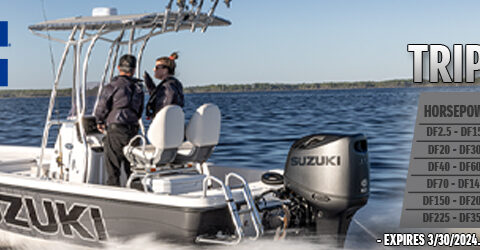Kids on Board: Tips for Success
Boating is a family activity, and family activities involve taking the kids along. The term “kids,” of course, involves everything from toddlers to teens, and while there is obviously a difference in how to deal with different age groups, there are some common sense things to consider whenever there are kids on board.
Safety First.
Obviously, you always want the kids to be (and feel) safe whenever they’re on your boat. The most obvious safety step (and one required by most state and federal boating regulations) is that every kid must wear a Coast Guard-approved personal flotation device. They come in all sizes, from infant to eighteen-and-up, and most kids get used to wearing them quickly, so buy every kid a life jacket and make them wear them whenever they’re on board.
Next, make sure your kids are protected from the harmful effects of the sun. Lather them up with high SPF sunblock and make sure they have good hats and sunglasses.
Many captains with kids have a hard rule: always be sitting when the boat’s underway. Sudden shifts in direction or bounces caused by waves and wakes can send a wobbly walker overboard in an instant.
Designated Sitter.
Kids do the darndest things, usually when your back is turned for an instant. It’s hard to captain your vessel and keep track of the kiddies at the same time. That’s why most parental units will designate someone to run the boat and someone else to concentrate on watching the kids. This is especially important when the kids are toddlers, getting into everything and feeling immortal as they tend to do.
Attention spanning.
Adults are happy to sit in the warm sun, watching the world (and other boats) go by, listening to tunes, talking quietly to each other … and they can do that for hours! Kids? Not so much. Successful family boaters know to pack in lots of activities to help keep the kids occupied during a boat outing. That may include books or board games, or some of the time-honored participation activities like “I spy with my little eye.” Older kids can be enlisted to help navigate, read charts, stand watch, man the anchor and other parts of boating, as age appropriate.
Energy management.
It’s important to keep kids hydrated and well fed, especially on a boat, in the sun and open air and after active physical activity like swimming, skiing or boarding. Always make sure you have an ample supply of cool drinks and healthful snacks in the galley for your gang. Sparkly waters and fruit juices are better than sodas and sugary drinks; trail mix, sliced apples and peanut butter, and nuts are better than chips and Cheetos.
Proactivity.
If you’ve got kids and you’re a boating family, then everyone needs to know how to swim. Your local Y (YMCA or YWCA) probably offers indoor swimming lessons. Sign the kids up as early in life as possible.
Make sure your boat’s communications systems are up and running. Hopefully, you’ll never need to make an emergency call for help, but you should ensure your radio systems are working properly in the rare event you do.
As the kids get older, enroll them in a boating safety course. Teach them the rules of the road, and safety practices onboard. They will not only be safer on your boat, but they’ll take that knowledge and skills with them as they grow older and maybe own a boat themselves later in life.





